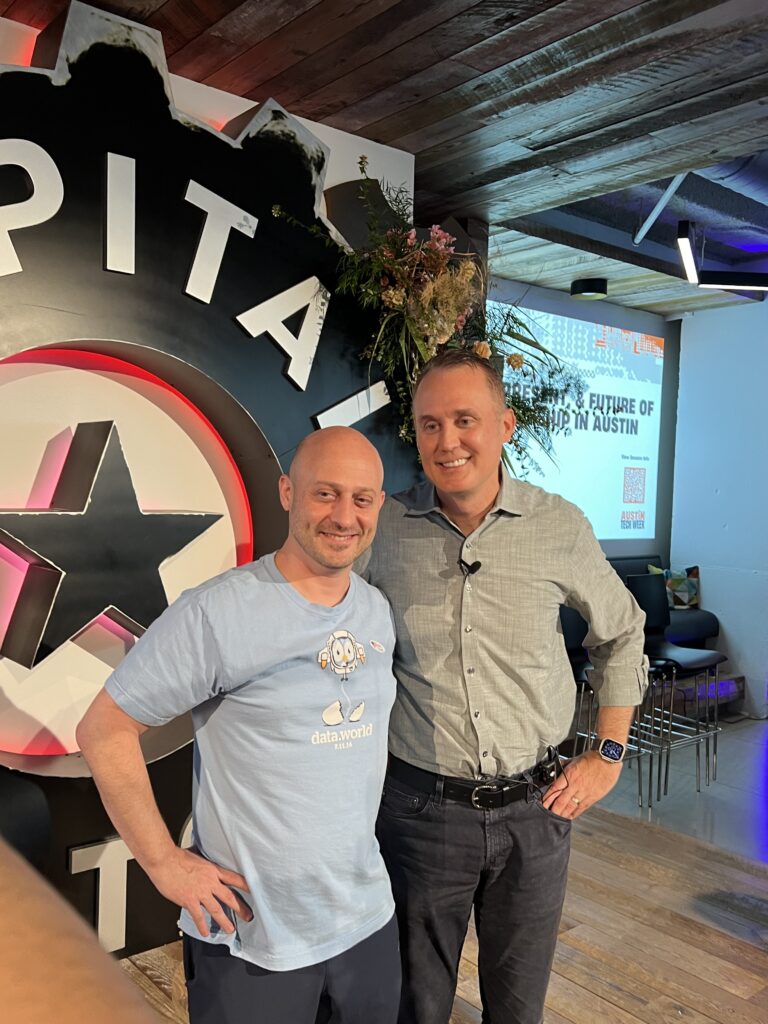
In a candid conversation during Austin Startup Week, two of the city’s most influential tech entrepreneurs—Joshua Baer, co-founder of Capital Factory, and Brett Hurt, founder and CEO of data.world—shared their unique perspectives on Austin’s transformation from a sleepy college town to a major tech hub.
The Early Days: Bootstrap Austin
“When I was a kid, Austin was the size of Anchorage, Alaska today,” Hurt recalls, painting a picture of a much smaller city where tech was barely a blip on the radar.
In 2003, the two entrepreneurs first crossed paths at Bootstrap Austin, one of the city’s earliest tech meetups. At the time, the concept of bootstrapping – building a company without external funding – was gaining traction as software and SaaS made it increasingly feasible to launch tech companies with minimal capital.
The meetup scene was sparse then, with Bijoy Goswami’s Bootstrap Austin being one of the only gathering places for tech entrepreneurs. Today, Capital Factory alone hosts over 60 regular meetups, showcasing the explosive growth of Austin’s tech community, Baer said.
The Rise of Austin’s Tech Ecosystem
The conversation between Baer and Hurt reveals how Austin’s tech scene evolved through successive waves of innovation. Hurt’s journey with Bazaarvoice, which went public in 2012 with a billion-dollar IPO, marked one of Austin’s early major tech successes. The company pioneered customer reviews for e-commerce and grew from initial meetings at Capital Factory to over 13,000 customers worldwide.
“We’re living in the best age in Austin’s history,” Hurt emphasizes, pointing to the city’s current advantages: “massive diversity of capital and funds.” This marks a dramatic shift from the early days when Austin Ventures was the only primary funding source in town.
Challenges and Opportunities
Despite the tremendous growth, both entrepreneurs acknowledge Austin faces significant challenges. Hurt, a native Austinite, expresses concern about Texas politics potentially deterring talent and companies. However, he sees Austin’s unique position as a place where different viewpoints converge as both a challenge and an opportunity.
“Austin is one of the few places where these things are forced to converge and live together,” Baer notes, suggesting that it could be unstoppable if Austin can maintain dialogue and collaboration across different perspectives.
The Next Wave: AI and Future Growth
Looking ahead, both entrepreneurs are bullish on Austin’s future, particularly with the emergence of AI. “You are going to see more change in the next 10 years than you’ve ever seen in the entire history of technology,” Hurt predicts, noting that companies like data.world are at the forefront of this transformation.
The impact of Austin’s tech scene is already rippling across Texas. As Hurt observes, Austin is no longer just “the pot smokers” to people in Dallas and Houston—it’s become the envy of the state, producing leading businesses not just in tech but also in restaurants, music, and entertainment.
The Secret Sauce: Lifting Each Other Up
According to both entrepreneurs, Austin’s tech ecosystem’s most distinctive feature is its collaborative culture. This spirit of “lifting each other up” has attracted major investors like Jim Breyer and countless entrepreneurs to the city, Hurt said. It’s a culture that dates back to Austin’s early days and continues to differentiate it from other tech hubs.
“We live in the most amazing time to learn how to be an entrepreneur,” Hurt said, citing today’s founders’ abundant resources, capital, and tools. From the early days of Bootstrap Austin to the current AI revolution, Austin’s tech scene continues to evolve while maintaining its fundamental spirit of collaboration and innovation.
As Texas’s capital city looks to the future, its tech community’s success appears to be built not just on technological innovation but also on maintaining the delicate balance between rapid growth and preserving the collaborative, supportive culture that made it special in the first place.
Hurt has also written a book, The Entrerpreneur’s Essentials. It’s based on his writing on Lucky7.io, his blog.
“Also, you can chat with my book and get it online for free at https://www.theentrepreneursessentials.com/ – I think it was the first book that you could chat with (I ingested it into a custom OpenAI GPT on the very first day they launched custom GPTs),” according to Hurt.
Hurt also recommended Mike Maples Jr.’s book Pattern Breakers. He wrote this review of the book.

